
Acontiinae is a subfamily of bird dropping moths in the family Noctuidae. There are more than 50 genera and 430 described species in Acontiinae, found worldwide in temperate and tropical climates.

Amphipyrinae is a subfamily of owlet moths in the family Noctuidae. There are more than 50 genera and 210 described species in Amphipyrinae, although the classifications are likely to change over time.

Cisthene is a genus of lichen moths in the family Erebidae. The genus was erected by Francis Walker in 1854.

Anarta is a genus of moths of the family Noctuidae.

Dichagyris is a genus of moths of the family Noctuidae. The former genera Loxagrotis, Pseudorichia, Pseudorthosia and Mesembragrotis are now considered subgenera of Dichagyris. From Greek dikha-gyris 'apart, asunder; double' + 'the finest meal or flour'; English pronunciation: /digh-kuh-JIGH-riss/, IPA [dɑj•kə'dʒɑj•ɹɪs].
Hemioslaria is a monotypic moth genus of the family Noctuidae. Its only species, Hemioslaria pima, is known from the US state of Arizona. Both the genus and species were first described by William Barnes and Foster Hendrickson Benjamin in 1924.
Nacopa is a genus of moths of the family Noctuidae erected by William Barnes and Foster Hendrickson Benjamin in 1924.
Paramiana is a genus of moths of the family Noctuidae erected by William Barnes and Foster Hendrickson Benjamin in 1924.
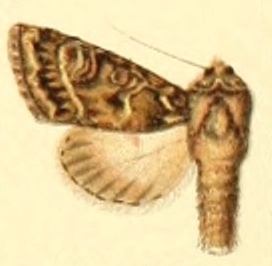
Scotogramma is a genus of moths of the family Noctuidae.
Supralathosea is a genus of moths of the family Noctuidae first described by William Barnes and Foster Hendrickson Benjamin in 1924.
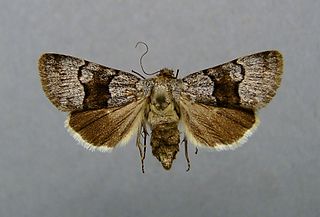
Sympistis is a genus of moths of the family Noctuidae. The genus was erected by Jacob Hübner in 1823.
Sympistis wilsoni is a moth of the family Noctuidae first described by William Barnes and Foster Hendrickson Benjamin in 1924. It is found in the Canadian provinces of Alberta and British Columbia.
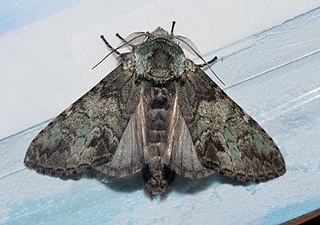
Macrurocampa is a genus of moths of the family Notodontidae erected by Harrison Gray Dyar Jr. in 1893. They are found primarily in North America.
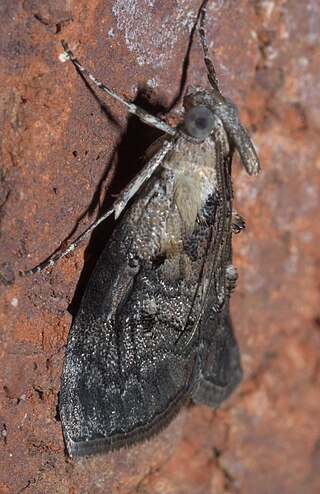
Pococera is a genus of snout moths in the subfamily Epipaschiinae, found mainly in North and Central America. It was described by Philipp Christoph Zeller in 1848.
Cacotherapia is a genus of snout moths. It was described by Harrison Gray Dyar Jr. in 1904 and is known from the United States, Guatemala, Mexico, and Panama.
Omphalocera occidentalis is a species of snout moth in the genus Omphalocera. It was described by William Barnes and Foster Hendrickson Benjamin in 1924 and is known from the US states of Nevada, Arizona and New Mexico.
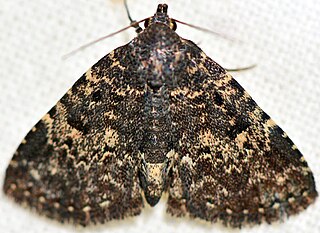
Metalectra diabolica, the diabolical fungus moth, is a moth of the family Erebidae. The species was first described by William Barnes and Foster Hendrickson Benjamin in 1924. It is found in North America, where it has been recorded from North Carolina to Florida and Arkansas to Texas.
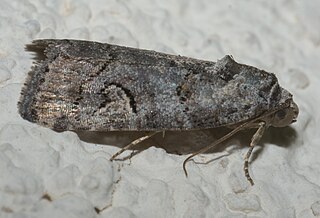
Triocnemidina is a subtribe of owlet moths in the family Noctuidae. There are about 16 genera and at least 30 described species in Triocnemidina.
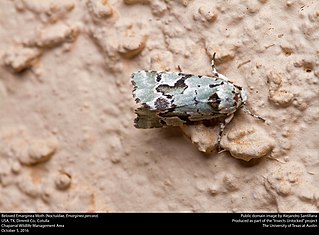
Psaphidini is a tribe of owlet moths in the family Noctuidae. There are at least 40 genera and at least 90 described species in Psaphidini.

Chamaecleini is a tribe of bird dropping moths in the family Noctuidae. There are about 9 genera and 14 described species in Chamaecleini.












